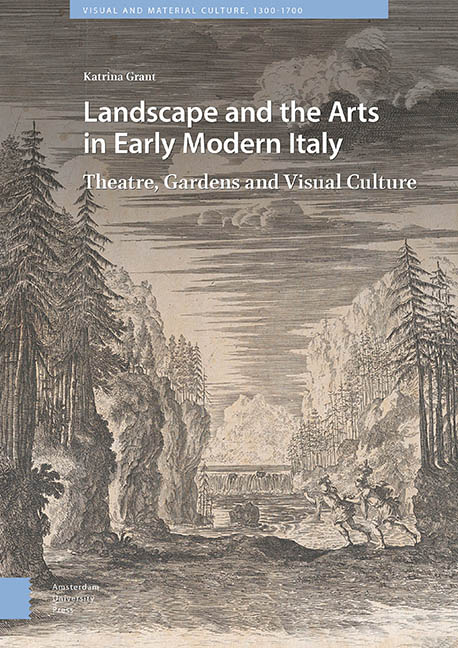Book contents
- Frontmatter
- Contents
- Acknowledgements
- Introduction
- 1 Theatricality, a View from the Landscape
- 2 Gardens of the Gods : Classical Revival, Intermedi, Early Opera and the Idea of Nature
- 3 The (Singing) Figure in the Landscape
- 4 Triumph over Nature : Machines and Meraviglia on the Seventeenthcentury Stage
- 5 The Theatre in the Landscape : Pliny to Pratolino
- 6 The Garden as Stage, the Visitor as Performer
- 7 Stages without Actors : Theatres of Sculpture, Water and Flowers
- 8 Performing in the Parrhasian Grove : Green Theatres and the Academies
- Bibliography
- Index
4 - Triumph over Nature : Machines and Meraviglia on the Seventeenthcentury Stage
Published online by Cambridge University Press: 15 September 2022
- Frontmatter
- Contents
- Acknowledgements
- Introduction
- 1 Theatricality, a View from the Landscape
- 2 Gardens of the Gods : Classical Revival, Intermedi, Early Opera and the Idea of Nature
- 3 The (Singing) Figure in the Landscape
- 4 Triumph over Nature : Machines and Meraviglia on the Seventeenthcentury Stage
- 5 The Theatre in the Landscape : Pliny to Pratolino
- 6 The Garden as Stage, the Visitor as Performer
- 7 Stages without Actors : Theatres of Sculpture, Water and Flowers
- 8 Performing in the Parrhasian Grove : Green Theatres and the Academies
- Bibliography
- Index
Summary
Abstract
As opera gained in popularity across the Italian peninsula the idea that sets should contribute to the ‘unity of place’ began to be superseded by a focus on the visual appeal of sets, and the surprise and wonder that they could induce in audiences. This demand for special effects and the fascination with aesthetics, such as ‘endless’ one-point perspectives, shaped the vision of nature presented on stage. Technical innovations meant that set designers and opera impresarios delighted in creating effects that mimicked nature, an approach that fed, and was fed by, contemporary interest in the human capacity to control and manipulate nature. This chapter looks at the phenomenon of macchine, or stage machinery, and the creation of immersive illusions of nature on stage. The role of the engineer in theatre is examined in relation to Giovanni Battista Aleotti, Francesco Guitti, and Giacomo Torelli in Venice. The way in which these techniques played into broader visual culture is examined at in relation to Bernini's work for the theatre in Rome.
Keywords: Opera, stage sets, stage machinery, engineers, Giacomo Torelli, Gianlorenzo Bernini, Giovanni Battista Aleotti, Francesco Guitti,
Of all the things which can be presented on a stage, none in my view more ravishes the minds of the spectators than the machines. This is because it is a source of great delight to witness things which are seemingly supernatural: such as an earth-bound person mounting to the sky; the appearance of a cloud filled with players and singers; seeing a temple rise up through the earth; a sudden scene-change to a wilderness or forest; seeing the ocean suddenly appear and in it tritons, gods, ships and other trompes-loeil. – Il Corago, c. 1630.
As opera gained in popularity across the Italian peninsula the idea that sets should contribute to the ‘unity of place’ was superseded by a focus on the visual appeal of sets and stage machinery (macchine) and the surprise and wonder (meraviglia) that they could induce in audiences. The delight that audiences took in the immersive possibilities of opera as a multi-sensory experience led to rapid technical innovations.
- Type
- Chapter
- Information
- Landscape and the Arts in Early Modern ItalyTheatre, Gardens and Visual Culture, pp. 113 - 144Publisher: Amsterdam University PressPrint publication year: 2022



